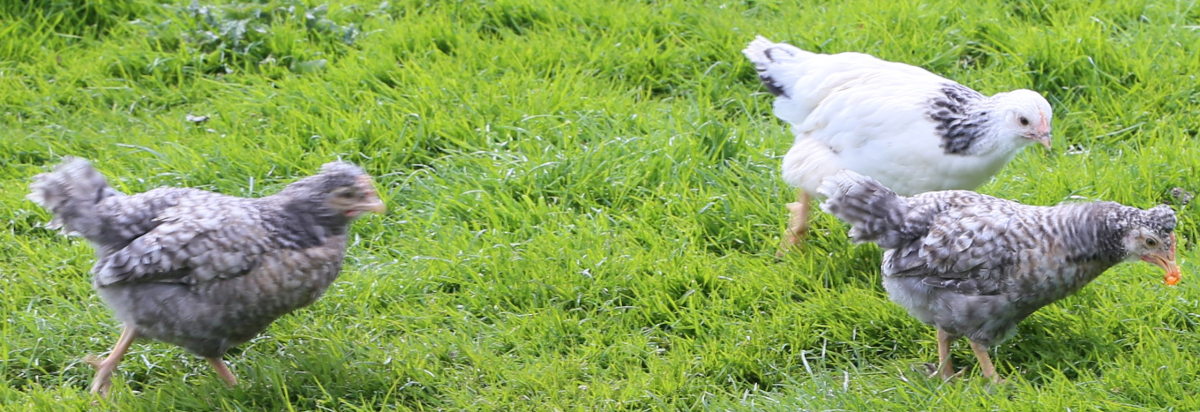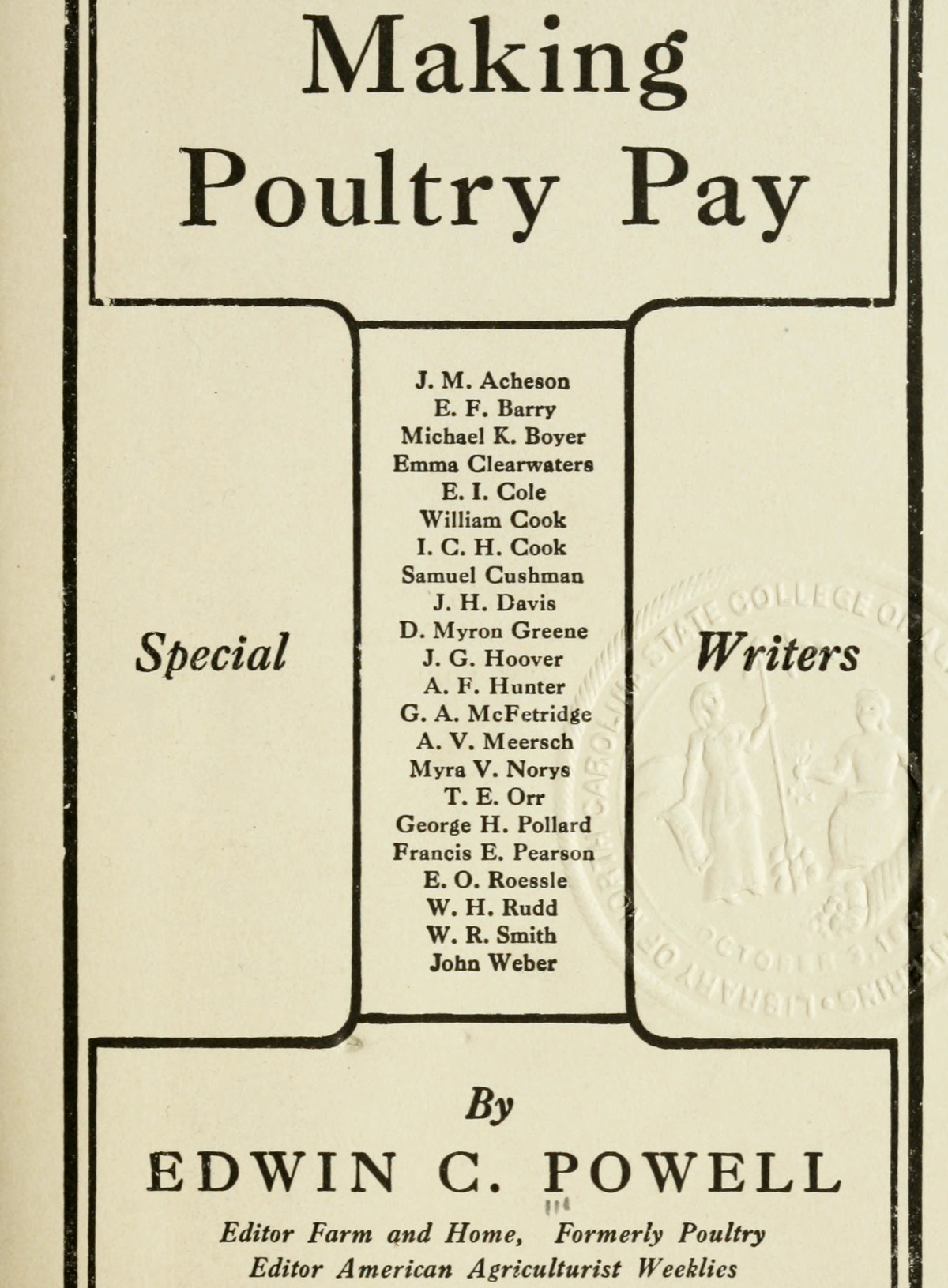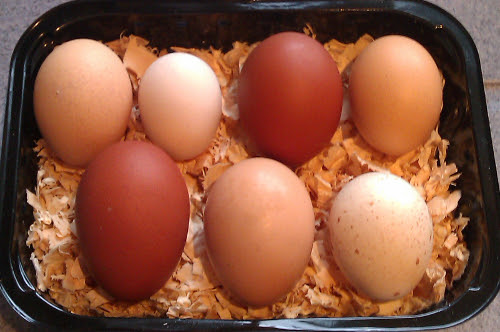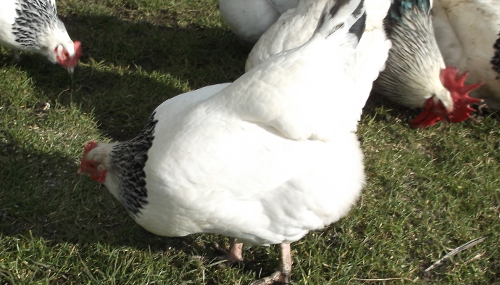Does Poultry keeping pay? 7 ways to profit from chickens.

I have been making small amounts of money from my chickens for years but it was only in 2000 that I earned enough money to exceed the allowances and I had to register to pay tax
How do you make money from chickens?
There are many benefits and advantages to keeping poultry and it is possible to make it pay and earn money from your chickens.
Sources of income from chickens is either from the sale of meat, eggs for eating or hatching, and from the sale of live birds. Chickens manure has value as a fertiliser and feathers are useful to fly tiers or craft workers.
Here in the UK it is only allowable to sell eggs from the driveway and ungraded unless you are a registered producer. Producing birds for meat is limited to yourself and family unless you are licensed.
For a few years now there has been schemes designed to get people to keep chickens for profit, promising them a second income, most of them are wildly inaccurate.
Below: This is nothing new as my research found "Making poultry pay" from 1907 by Edwin c. Powell, and I'm sure there must be many others from even earlier.

How many chickens do you need to make a profit?
It really depends on the demand in your area but I would say you need at least 16 chickens to make your enterprise worthwhile.
Two hybrid chickens would give you a dozen eggs a week and 16 birds would give around 8 dozen eggs a week. If you were to sell 6 dozen of these after you kept enough for yourself then that would be around £18 ($24) which would be enough to pay for the feed and leave a little over to invest in new birds later on.
If you are raising rare breeds and selling the eggs and show quality chicks and birds then you may get away with half that number.
Below: A selection of eggs from my hens.
Fresh free range or hatching eggs bring in seasonal cash. You don't get as many eggs during the winter months and you still need to pay for chicken feed.
Keeping laying hens intensively for the mass market is profitable, keeping up to a hundred thousand birds in caged, free range or barn environments for supermarkets and the like can definitely be an earner, especially as markets of this size are predictable and there are huge economies of scale to be had in transportation and feed purchase.
How to make money from chickens:
- Selling eggs - You can sell the surplus eggs from your backyard flock to supplement or even pay your feed bill. If you are shrewd and careful you may even be able to turn a tidy profit over the course of the year. Income potential - £2 - £3 ($3 to $5) per dozen.
- Selling fertile or hatching eggs - This is a little more involved as you will need at least 1 rooster for each breed you wish to produce eggs for but the returns are greater. I sell hatching eggs for between £1 and £10 ( $1.30 and $15) depending on the breed. Also the buyer pays shipping. Income potential - £300 to £500 ($500 to $800) per year per breed.
- Selling day old chicks - I do this as well, take orders from my website and local people and then hatch those birds to order over the season. Day old chicks typically cost £4 to £20 ($6 to $30) again depending on the breed and number purchased. Income potential - £300 ($500) per 100 chicks.
- Selling pullets you have raised - Raise your own hybrid or auto-sexing layers or produce a strain of coloured or olive egg layers that will be in demand and command a higher price. I sell rare breed pullets for between £25 and £50 ($40 and $75) and auto-sexing hybrids for £16 or about $22. there are places that raise larger numbers and charge less. Income potential - £500 ($800) per 100 pullets.
- Selling Meat - I don't raise any birds specifically to sell as meat but I have a ready market for my surplus cockerels. The profit is small per bird, around £2 ($3) each but it is worth it. It takes time to cultivate this market and it is heavily regulated. I know quite a few people that like the flavour of an older stewing bird over the pale white supermarket meat.
- Selling chickens manure fertiliser - Just compost for a year and bag up the following year to sell to backyard gardeners or allotment holders to enrich their soil. Income potential - £3 to £5 ( $4 to $6 ) per year per chicken.
- Selling feathers - For crafts and and fisherman who tie their own flies for fly fishing. It is however quite a limited market. Income potential - £30 to £50 ($50 to $80) per year.
There is increased risk with higher returns, a single fox attack may ruin your profits for the entire year.
Choosing which types to keep for profit:
There is of course no economic sense in producing a product unless someone is willing to pay the price that will allow you to realise a reasonable profit.
So do you keep cheap to purchase hybrids with predictable laying patterns or rare breeds, where the birds will have a higher value but less laying return?
At first it may seem like an easy choice, take the hybrids, they lay more eggs and more regularly than heritage types of chicken and the return on your investment will be quicker.
Below: Chickens that have had success at poultry shows can be immensely valuable.
There is not generally the market for hybrid hatching eggs and there is a premium to be had for rare breed eggs both for eating and the hatching market.
You need to know what the volume of product your customers want and how often will they want it? - This is the demand and without it you will fail.
Hybrids are the most profitable chickens to keep. They are cheap to buy and lay many eggs per year.
What do you need for a poultry enterprise?
- Free time.
- Space.
- Initial capital to set up.
- A plan.
How much "free" time do you need? - If you plan to maximise profits by having all the labour come from your own family, you must remember that birds need to be checked, fed, and watered daily. Eggs also need to be gathered frequently, processed, and refrigerated.
Animal production can lead to a very restrictive lifestyle. If you have livestock then holidays and vacations are difficult and best and sometimes impossible.
Do you have the size of operation that can produce a reasonable volume of product, and through the year, egg production is notoriously seasonal which is why commercial operations use lights to control the day length.
Without some sort of ongoing planning for your poultry business you will eventually fail. Contingency and forward planning for new stock and equipment need to be factored in to the equation.
Many buyers will not want to deal with producers who can only supply a small volume so you will be stuck selling to neighbours, colleagues and passers by.
Are chickens worth it?
Yes, chickens are worth the effort, they are good to have around, keep the bugs down and are cheap to feed and in return there is quite an opportunity for financial return.
Like everything in life there are some investments to be made, planning to be done and ongoing chores around poultry keeping.
How much money can you make from chickens?
I would be very sceptical of any claims that you can make 1,000.00's a year from 16 or even 24 chickens, that is not my experience.
I conducted an very unscientific poll of a few of my fellow chicken keepers locally, all of whom sell their surplus eggs, some from rare breeds and some from hybrids and raise small numbers of birds every year.
Profit in all cases was between £3 and £9 per bird per year and did not take into account the initial set up costs. £9 per bird isn't going to make anyone rich and the real benefit comes in the money they save you by providing you with eggs and chicken.
Below: I really like keeping my Light Sussex and sell around 30 pullets a year. It will never make me rich.

Selling a few rare breed hens won't make you rich but it may pay for your feed bill.
I sell a rare breed Point of lay pullets for between £25 and £50 ( $40 to $75) depending on the breed.
Below: Rare breeds like these Wyandottes will be worth more:
This may seem like a lot but 50% of my hatch is males and only a few are ever sold.
You can maximise your profits to some extent by using auto-sexing birds making it easy to identify the surplus cockerels at day old.
Here is a few other ways to keep chicken keeping costs down:
- Free range your birds.
- Buy your feeding bulk to keep costs down.
- Forage for windfall fruit and other feed supplements.
- Guinea fowl produce amazing eggs and are cheap to keep.
All of the people in my survey keep show quality poultry and sell the surplus and a few of the keep hybrids just for eggs.
The problem, in my eyes, that surfaces is when you keep birds purely for their financial benefit, you may begin to overlook the needs of the birds or just not care about the quality of the breed you produce.
One of the problems I have come across far too often is the sale of hatching eggs for very poor examples of breeds. The need to make a possible cash return on ones investment is leading to some really poor breeding and chicken keeping practises.
You see this often if you buy hatching eggs on eBay - sub quality specimens where the seller is just trying for maximum turnover.
